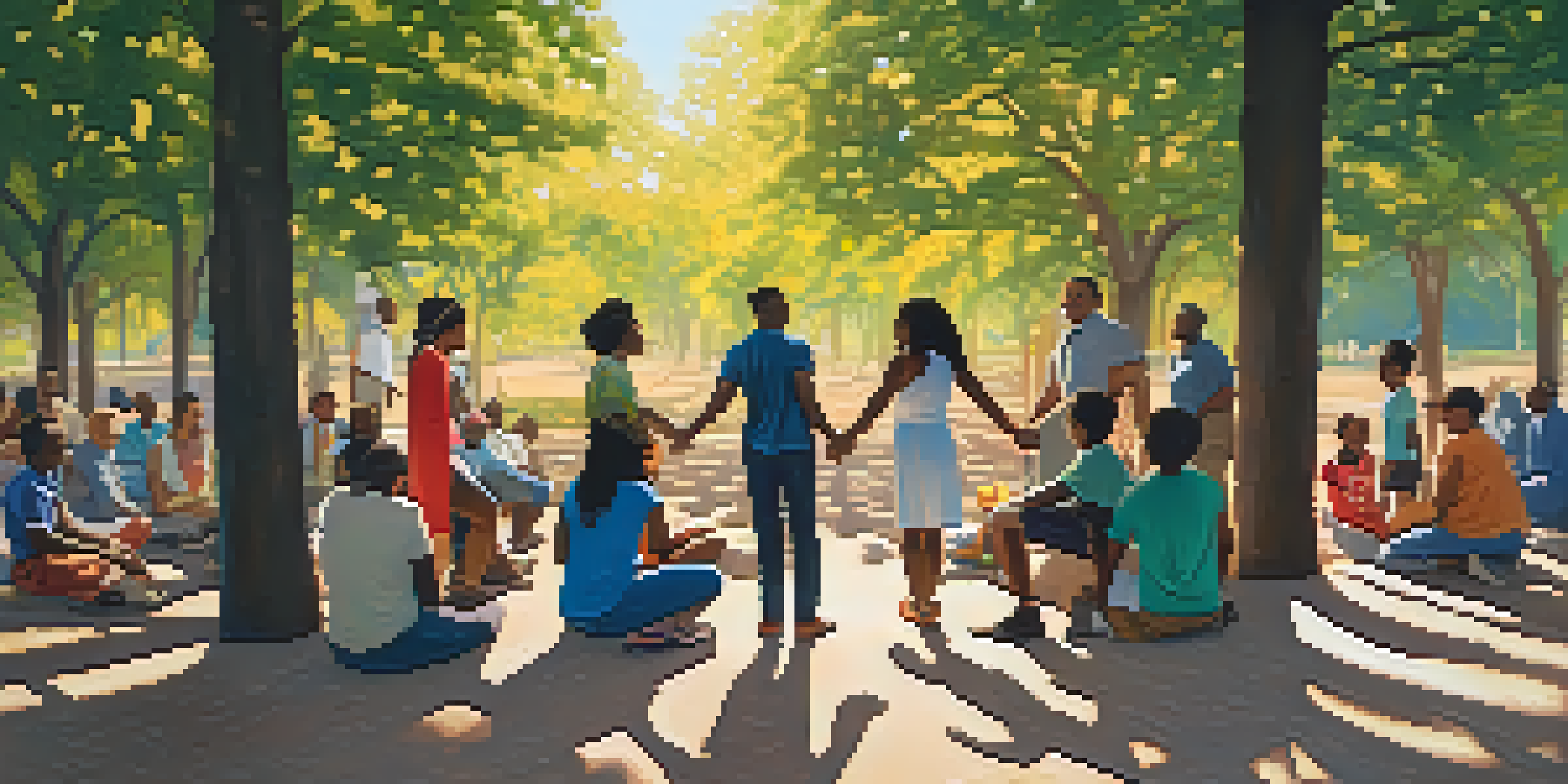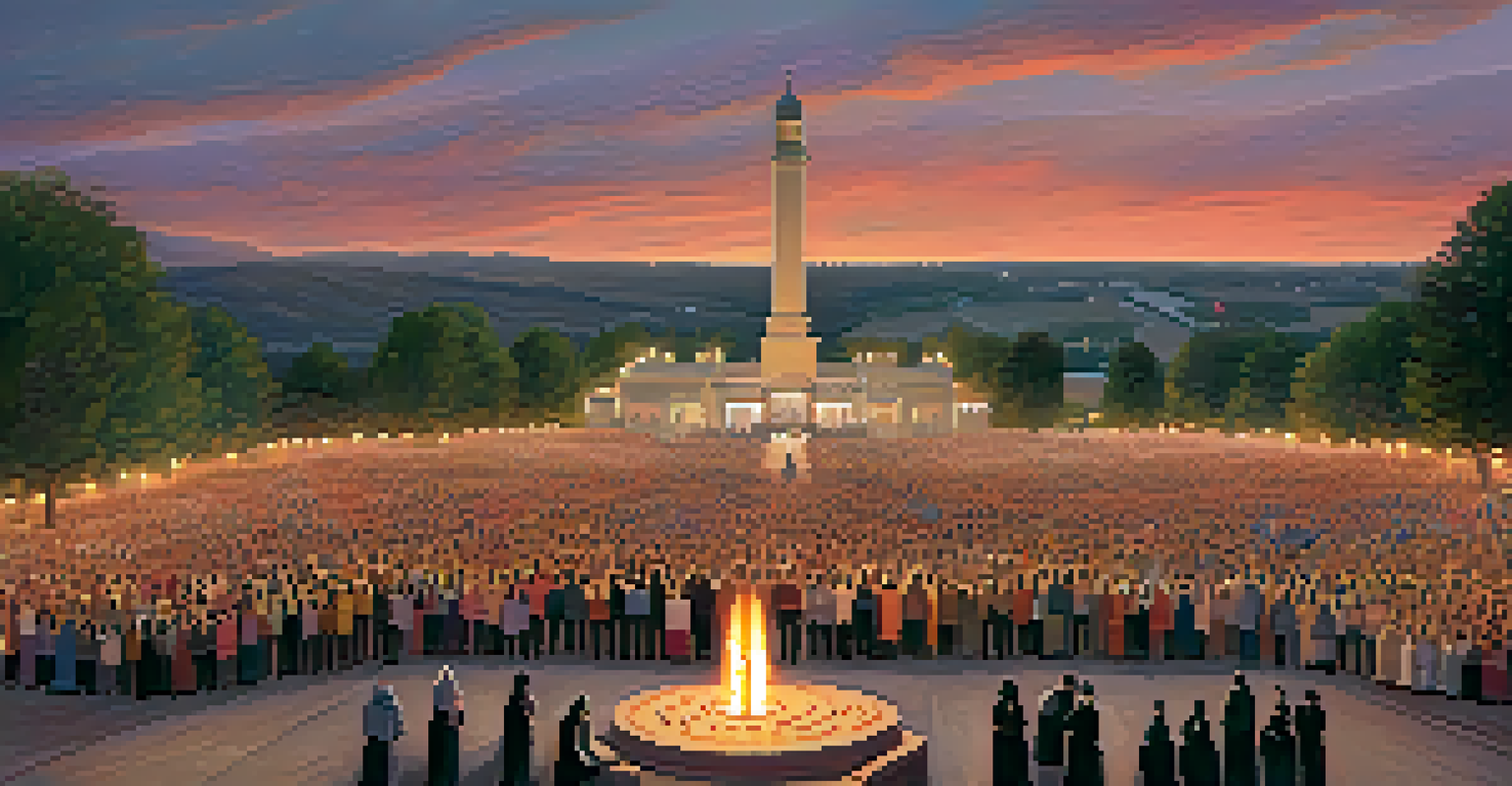The Impact of Prayer on Social Justice Advocacy

Understanding the Spiritual Connection to Justice
At its core, prayer serves as a spiritual connection that many find essential in advocating for social justice. It acts as a grounding force, providing clarity and purpose amidst the chaos of social issues. When individuals or groups come together to pray, they often find unity in their shared values and goals, fostering a sense of community and collective strength.
Prayer is a mighty weapon. It is a weapon against injustice, oppression, and despair.
This communal aspect of prayer can inspire collective action, as it encourages individuals to step beyond their personal struggles and focus on broader societal issues. For instance, many activists cite prayer as a source of motivation when they feel overwhelmed by the enormity of the challenges they face. This spiritual uplift can transform despair into determination, fueling the fight for justice.
Moreover, prayer can also provide a moral framework for social justice advocacy, guiding individuals to act with compassion and empathy. By seeking divine guidance, advocates often reflect on their intentions, ensuring they align with values of equity and inclusion. This reflective process is crucial in navigating the complexities of social advocacy.
Prayer as a Catalyst for Community Mobilization
Prayer gatherings have historically served as a powerful catalyst for mobilizing communities around social justice causes. These gatherings create a safe space where individuals can voice their concerns, share their hopes, and come together to envision a better future. For example, prayer vigils during times of crisis have often brought people together to advocate for change, demonstrating the collective power of their voices.

Additionally, prayer can ignite passion among community members who might otherwise feel isolated in their struggles. When people witness others coming together in faith and determination, it can inspire them to join the movement, amplifying the call for justice. This ripple effect can lead to larger movements that demand systemic change.
Prayer Unites Communities for Justice
Prayer gatherings create a safe space for individuals to share concerns and inspire collective action towards social justice.
The act of praying for justice often encourages participants to engage in other forms of advocacy, such as protests, community service, and educational efforts. It is not uncommon for prayer events to be followed by organized actions that aim to address the very issues raised during those gatherings. This seamless transition from spiritual reflection to practical action highlights the interconnectedness of faith and social justice.
Fostering Resilience Through Prayer
In the face of adversity, prayer provides a sense of resilience that many activists lean on. The emotional and spiritual support derived from prayer can help individuals cope with the challenges that arise during their advocacy efforts. Whether it's dealing with setbacks or facing criticism, prayer can serve as a source of strength that motivates individuals to persevere.
To be a Christian without prayer is no more possible than to be alive without breathing.
Moreover, prayer can be a reminder of the larger purpose behind the struggle for justice. It allows advocates to reconnect with their mission and the communities they serve, reinforcing their commitment to the cause. For many, this reinforcement is crucial in maintaining focus and preventing burnout in long-term advocacy efforts.
Additionally, resilience nurtured through prayer often extends beyond the individual, fostering a supportive network among advocates. When individuals share their struggles in prayer, they create a bond that helps them lean on each other during tough times. This interconnected support system is vital in sustaining long-term advocacy efforts.
Prayer and Ethical Leadership in Advocacy
Prayer can play a significant role in shaping the ethical framework of leaders in social justice movements. By grounding their actions in prayer, leaders often seek guidance that aligns their decisions with principles of justice, equity, and compassion. This spiritual foundation can lead to more thoughtful and inclusive approaches to advocacy.
Furthermore, leaders who engage in prayerful reflection are often more attuned to the needs and voices of marginalized communities. This deepened awareness can drive a more empathetic leadership style, ensuring that the perspectives of those affected by injustice are prioritized in discussions and decision-making processes. Such ethical leadership fosters trust and collaboration within the community.
Prayer Builds Resilience in Activists
Engaging in prayer provides emotional and spiritual support that helps activists cope with challenges and maintain focus.
Leaders who incorporate prayer into their advocacy also serve as role models, inspiring others to approach social justice work with integrity and purpose. Their commitment to both spiritual principles and social change can encourage a new generation of advocates to follow suit, further embedding ethical considerations into their activism.
The Global Influence of Prayer on Social Movements
Around the world, prayer has been a unifying force in various social movements, transcending cultural and geographical boundaries. From the Civil Rights Movement in the United States to anti-apartheid struggles in South Africa, prayer has galvanized individuals to unite for a common cause. These historical examples illustrate the profound impact that prayer can have on collective action.
In many cultures, prayer rituals play a crucial role in social justice advocacy, often becoming a symbol of hope and resilience. For instance, indigenous communities may incorporate traditional prayers into their activism, blending spirituality with the fight for land and rights. This fusion of faith and advocacy reflects the diverse ways in which prayer can inspire action across different contexts.
Moreover, the global nature of prayer in social movements highlights the interconnectedness of various struggles for justice. As advocates from different backgrounds share their experiences and prayers, they often find common ground, fostering solidarity across borders. This global network of prayerful activism strengthens the collective push for justice on a larger scale.
Prayer and the Quest for Inner Peace
For many advocates, prayer serves as a vital tool for maintaining inner peace amidst the chaos of social justice work. The emotional toll of fighting for change can be overwhelming, and prayer provides a refuge where individuals can recharge and reflect. This space of tranquility allows advocates to process their experiences, fostering emotional resilience.
Inner peace cultivated through prayer can also enhance an advocate's ability to engage constructively with others. When individuals are grounded in their spiritual practices, they are often better equipped to handle conflicts and disagreements that may arise within their movements. This calm approach can lead to healthier, more productive dialogues among diverse groups.
Global Impact of Prayer in Movements
Across cultures, prayer acts as a unifying force in social movements, fostering solidarity and inspiring collective action for justice.
Furthermore, the quest for inner peace through prayer encourages advocates to practice self-care, recognizing that their well-being is essential for sustaining their activism. By prioritizing their mental and spiritual health, advocates can remain energized and focused on their mission, ultimately benefiting the communities they serve.
The Future of Prayer in Social Justice Advocacy
As society continues to grapple with pressing social issues, the role of prayer in advocacy is likely to evolve and adapt. With the rise of technology and social media, virtual prayer gatherings are becoming more common, allowing advocates to connect and mobilize on a larger scale. This shift opens new avenues for collective prayer, enabling a diverse range of voices to unite for justice.
Moreover, the increasing recognition of mental health's importance in social justice work may lead to a greater emphasis on prayer as a tool for self-care and resilience. Advocates may increasingly incorporate spiritual practices into their routines, ensuring they remain grounded and focused in their efforts. This holistic approach can strengthen the overall impact of social justice movements.

Ultimately, the future of prayer in social justice advocacy will likely continue to reflect the diverse beliefs and practices of individuals involved. As movements grow and change, the ways in which prayer is integrated into advocacy will adapt, ensuring that it remains a vital source of strength, guidance, and hope for those fighting for justice.